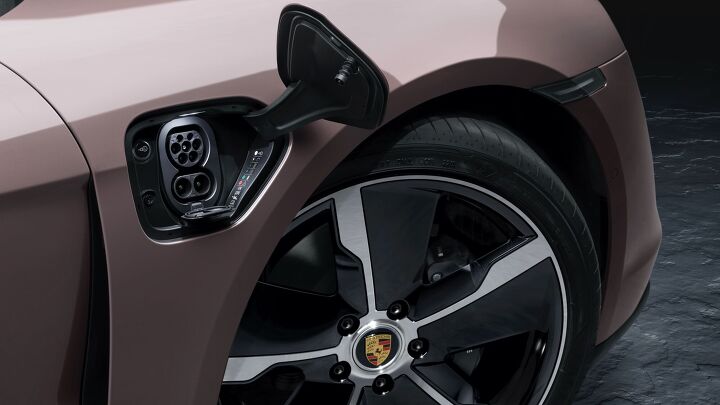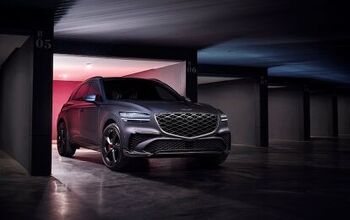Porsche Casts Doubt Upon Combustion Ban Timeline

While we’re constantly hearing about tightening emissions regulations, the relevant timelines issued by government actors are rarely adhered to. Electric vehicle subsidies went from temporary to indefinite and combustion bans have gone from right around the corner to anyone’s guess. This is also true of the industry itself, which often makes bold promises designed to appease a subset of the public only to repeatedly move the target date back a few years.
With this in mind, Porsche’s CFO was recently quoted as saying European combustion bans will probably need to be delayed and there’s good reason to believe him.
As things currently stand, the European Union has plotted banning the sale of new combustion-engine cars by 2030. However, Porsche Chief Financial Officer Lutz Meschke was quoted by Automotive News on Thursday casting some doubts.
"There's a lot of discussions right now around the end of the combustion engine," Meschke said in Singapore. "I think it could be delayed."
Despite Europe having adopted battery electric vehicles far more quickly than North America, the market is still confronting a lot of the same problems. In 2022, the EU estimated that 21.6-percent of all new car registrations were electric vehicles. That number was presumed to be around 5.9 percent in the United States, according to data accumulated from Kelly Blue Book.
While the EU does tend to lump plug-in hybrids into EV sales tabulations, the region is still outpacing the United States and Canada in terms of both PHEV and BEV volumes. But we continue to see similar complaints about public charging sites, fumbled vehicle launches, and have witnessed global electric sales begin to plateau by summer of 2023. Manufacturers have also signaled they’ll need more time to finish constructing EV facilities and started grumbling about subsidies being cut off.
It appears that European electrification efforts are confronting the same issues faced everywhere — leading to predictable results. UK Prime Minister Rishi Sunak announced the country would be pushing back a national combustion ban until 2035 last September and everyone is wondering if the European Commission will follow suit.
From Automotive News Europe:
A slowdown in EV orders has thrown into question whether the European Union is on track for the phaseout, which represents one of the most ambitious efforts to curb carbon emissions.
The region's consumers have been put off by a lack of reliable charging networks, persistently high prices and the rollback of EV incentives. The U.K. has already postponed its planned ban of new gasoline and diesel models by five years to 2035.
While manufacturers of premium and luxury EVs can work without subsidies, cutting them from the volume segment is wrong, said Meschke, who spoke on the sidelines of the unveiling of Porsche's long-delayed electric Macan SUV.
"We have to see how steep the ramp-up curve is in coming years," Meschke said. "If we have a situation like now, with certain reluctance to buy electric cars in Europe, then maybe the subsidies will come back."
Your author has repeatedly suggested ending electric vehicle subsidies, so it’s impossible to provide an unbiased take on the value of EV subsidies. The issue has also become stupidly divided along political lines, ensuring that hoards of people will cheer for opposing outcomes without giving it much thought. But it’s undeniable that the automotive sector is highly influential thanks to aggressive lobbying efforts and grossly overestimated its abilities to transition toward all electric vehicles.
Some have even alleged that the industry has intentionally sabotaged electric vehicles to use them as a scapegoat for controversial technologies companies wanted to pioneer before moving them into mainstream combustion models. That perhaps requires too much creative thinking to be seriously entertained without hard evidence. Botched product launches can be attributed to a generalized downturn in quality control and an over-reliance on software. Loathed public charging stations (Tesla Superchargers excluded) may also just be the result of the involved companies underestimating the level of maintenance required.
But the above doesn’t preclude automakers from wanting to take advantage of government money. As part of Volkswagen Group, Porsche is technically supposed to be committed toward transitioning its fleet to all-electric vehicles. However, the company is also trying to pioneer synthetic fuels (often called “e-fuels”) it has framed to the public as environmentally sound. Germany even found itself at odds with the European Commission after the latter decided against categorizing vehicles using synthetic fuel to fall outside prospective combustion bans. The reasoning behind this looks to be purely economical, as Germany sees e-fuels as a burgeoning industry with serious potential that it also just happens to be leading.
The largest piece of the puzzle is likely public opinion, however. Despite years of the industry trying to assure drivers that EV costs would be even to combustion vehicles by 2025, we’re not even close to that becoming a reality. Electric automobiles tend to be purchased by wealthier individuals as a secondary vehicle and (with notable exceptions) trade at much higher prices. They also depreciate more quickly, making them less attractive to the kind of people that care about resale values.
These factors have joined together with evaporating incentives to paint kind of a bleak picture for mainstream electrification. EV volumes remain slanted toward the luxury market at a time when the average person's purchasing power has declined, leaving the truly economical models to compete directly with gasoline-reliant alternatives boasting lower price tags. Assuming EVs offered a superior experience across the board, this wouldn’t be an issue. But electric cars tend to thrive under specific use cases, whereas combustion vehicles tend to be versatile and already have an established infrastructure to support them.
Now we're seeing automakers and governments that have been blindly championing the creation of "ultra-low emissions zones," and endorsing a forced pivot toward all-electric vehicles, openly questioning the feasibility of the very thing they've been fighting for since the early 2000s. We should probably take Porsche’s comments seriously.
[Image: Porsche]
Become a TTAC insider. Get the latest news, features, TTAC takes, and everything else that gets to the truth about cars first by subscribing to our newsletter.

A staunch consumer advocate tracking industry trends and regulation. Before joining TTAC, Matt spent a decade working for marketing and research firms based in NYC. Clients included several of the world’s largest automakers, global tire brands, and aftermarket part suppliers. Dissatisfied with the corporate world and resentful of having to wear suits everyday, he pivoted to writing about cars. Since then, that man has become an ardent supporter of the right-to-repair movement, been interviewed on the auto industry by national radio broadcasts, driven more rental cars than anyone ever should, participated in amateur rallying events, and received the requisite minimum training as sanctioned by the SCCA. Handy with a wrench, Matt grew up surrounded by Detroit auto workers and managed to get a pizza delivery job before he was legally eligible. He later found himself driving box trucks through Manhattan, guaranteeing future sympathy for actual truckers. He continues to conduct research pertaining to the automotive sector as an independent contractor and has since moved back to his native Michigan, closer to where the cars are born. A contrarian, Matt claims to prefer understeer — stating that front and all-wheel drive vehicles cater best to his driving style.
More by Matt Posky
Latest Car Reviews
Read moreLatest Product Reviews
Read moreRecent Comments
- ED I don't know what GM is thinking.I have a 2020 one nice vehicle.Got rid of Camaro and was going to buy one.Probably won't buy another GM product.Get rid of all the head honchos at GM.This company is a bunch of cheapskates building junk that no one wants.
- Lostjr Sedans have been made less practical, with low rooflines and steeply raked A pillars. It makes them harder to get in and out of. Probably harder to put a kid in a child seat. Sedans used to be more family oriented.
- Bob Funny how Oldsmobile was offering a GPS system to help if you were lost, yet GM as a company was very lost. Not really sure that they are not still lost. They make hideous looking trucks, Cadillac is a crappy Chevy pretending to be fancy. To be honest, I would never step in a GM show room now or ever. Boring, cheap ugly and bad resale why bother. I get enough of GM when i rent on trips from airports. I have to say, does anybody at GM ever drive what everyone else drives? Do they ever then look at what crap they put out in style fit and finish? Come on, for real, do they? Cadillac updated slogan should be " sub standard of the 3rd world", or " almost as good as Tata motors". Enough said.
- Sam Jacobs I want a sedan. When a buy a car or even rent one, I don’t want to ride up high. I don’t want a 5-door. I want a trunk to keep my stuff out of sight. It’s quieter, cars handle better, I don’t need to be at the same height as a truck. I have a 2022 Subaru Legacy Touring XT, best car ever, equipped as a luxury sedan, so quick and quiet. I don’t understand automakers’ decisions to take away sedans or simply stop updating them — giving up the competition. The Camry and Accord should not be our only choices. Impala and Fusion were beautiful when they were axed.
- Spamvw I think you need to remember WHY the big 2 and 1/2 got out of the car business. Without going political, the CAFE standards signed into law meant unless you had a higher gas mileage fleet, you couldn't meet the standards.The Irony is that, the law made sedans so small with low roof lines, that normal people migrated to SUV's and Trucks. Now we get worse mileage than before.


































Comments
Join the conversation
Relevant
Peter Puffers! TTAC B&Bers in Disguise!